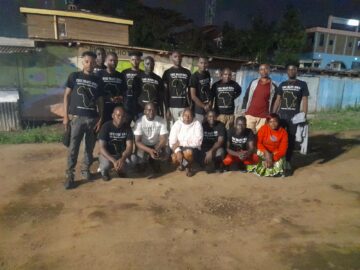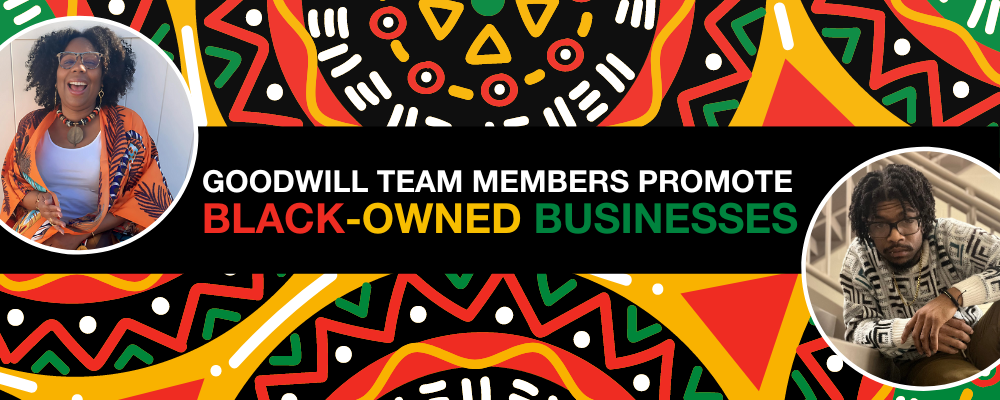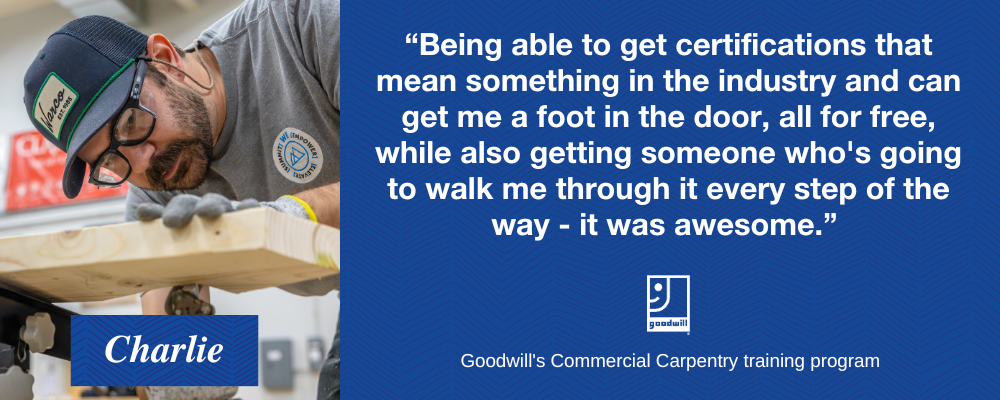Black History Month is a time to celebrate and honor Black culture. From listening to music created by Black artists, delving into Black history, reading books by Black authors and even shopping at Black-owned businesses, there are many ways to support Black Americans and the Black diaspora during the month or all year long.
Here at Goodwill, we’re showing our support by highlighting two team members who not only work for our organization, but also own and operate small businesses outside of work.
Manager of Learning and Organizational Development, Shelley Tyler-Smith owns The Main Idea, which sells jewelry and accessories made in Nairobi, Kenya.
“We work with the local artisans in Kenya and make sure that they’re paid fair wages, that everything is ethical and sustainable,” Shelley explained. “We work together on the designs; they send them back here to us and then we sell them to people.”
Shelley has been in business for about five years, and while there’s been different iterations of her business, her goal has remained the same as to why she became a Black business owner.
“I wanted to circulate the Black and Brown dollar. I wanted to create some kind of business or business model where I was purchasing from people of color, serving people of color and just making sure that that money went back into our communities in some kind of way,” Shelley explained.
Like Shelley, Jacole Britt, Endpoint Security Tech in Goodwill’s IT department, owns a business. His business Ryeale is a photography business with a niche in cosplay, an activity and performance art in which participants called cosplayers wear costumes and fashion accessories to represent a specific character.
His love for photography began years ago with his passion for art.
“I think overall it’s just art in general, or just the appreciation for things that aren’t really noticed or aren’t really recognized all the time,” Jacole said. “[Photography] is a capture in time. And time is always fleeting.”
While being a Black business owner comes with many rewards, there are also challenges. Using the Census Bureau’s Annual Business Survey (ABS) data on employer firms, Brookings found that Black people represent more than 14 percent of the nation’s population, but only 2.4% are business owners. One of the reasons for these lower numbers compared to other demographics is a lack of access to tools and resources, like capital.
For Jacole, who has been a business owner for nearly nine years, lack of capital can mean not having the latest and greatest equipment for shoots, but that hasn’t stopped him from achieving success.
When talking about one of his regular clients he said, “Ever since I started working with her, she’s been getting more exposure. More people have been noticing her at cons and then a couple of months ago, she just got some of her photos into a magazine.”
“When you are trying to get access to capital, people always think poverty. They don’t think empowerment. They don’t think talent. They don’t think tradition. I struggle to get access to grants and capital because people don’t really understand my business model and its impacts,” Shelley explained. “Not realizing that we’re employing African artisans and making sure they get money, making sure they are being paid fairly, but also celebrating the rich tradition of Africa and the things that people give and then bring back here and wear with pride.”
For both Jacole and Shelley, support comes in many forms. For Shelley, who strives to highlight artisanship and craftmanship in Africa, it’s being able to share how culture and history can be woven into corporate America.
“I love to see my colleagues in my merchandise, and a lot of times I ask them if I can I take a picture,” Shelley said. “Not for me, but because I want to send it back to Kenya to show them there’s someone in a corporate environment wearing the earrings that you made or a bracelet that you made.”
For Jacole, who’s looking to build his client list, team members can support him by referring him and his business to their network.
Shelley also adds, “Make sure the support is genuine, not just performative. If it’s not something that you’re really interested in, you can support by sharing.”
You can support Shelley and Jacole by visiting their websites www.iamthemainidea.com and www.ryeale.com.









Join the Conversation